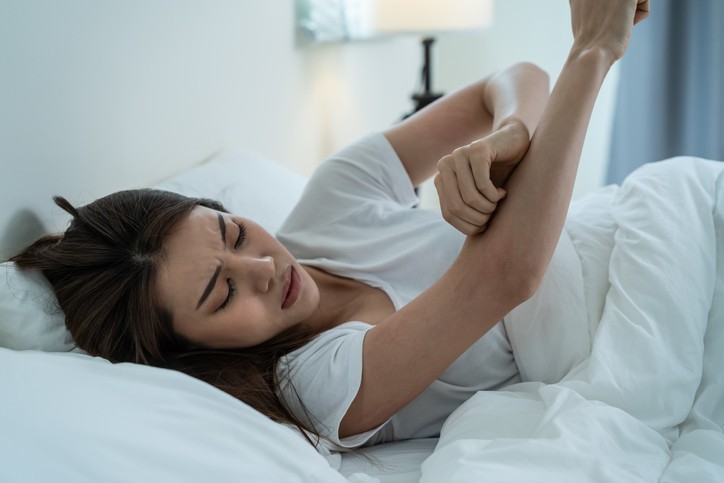 Frustrated woman scratching arm due to nighttime itch.
Frustrated woman scratching arm due to nighttime itch.
It’s a familiar scenario for many: you settle into bed, ready for a peaceful night’s sleep, only to be plagued by an incessant itch. This frustrating experience, known as nocturnal pruritus, is surprisingly common. You might find yourself scratching at itches that were either nonexistent or easily ignored during the day. So, what’s behind this nighttime itch, and more importantly, what can you do about it?
What is Nocturnal Pruritus?
Nocturnal pruritus is the medical term for itching that worsens or occurs primarily at night. It’s not just a minor annoyance; for some, it can significantly disrupt sleep and impact quality of life. Understanding the underlying causes is the first step to finding effective relief.
Common Causes of Nighttime Itching
Several factors can contribute to why you might find yourself itching more at night. Often, it’s related to natural shifts in your body’s systems.
Circadian Rhythm
Your body operates on a 24-hour internal clock called the circadian rhythm. This cycle influences various bodily functions, including skin physiology. At night, several changes occur in your skin that can trigger itching. Blood flow to the skin increases, making you feel warmer, which can exacerbate itch sensations. Additionally, the levels of corticosteroids, natural hormones that reduce inflammation and itching, tend to be lower at night. This combination of increased skin temperature and reduced anti-inflammatory agents can make you more susceptible to itching.
Hormonal Changes
Hormonal fluctuations, particularly those associated with menopause and pregnancy, can also play a significant role in nighttime itching. These hormonal shifts can lead to skin dryness, a common trigger for itching. Dry skin becomes more sensitive and prone to irritation, and this sensation can feel more intense at night when other distractions are minimal.
Medications and Skin Products
Certain medications and everyday skin care products could be contributing to your nighttime itch. Antibiotics, blood pressure medications, opioids, and diuretics are among the drugs that can sometimes cause itching as a side effect. Similarly, some soaps, deodorants, bug repellents, or even laundry detergents might contain ingredients that irritate your skin, leading to itching, especially when your skin becomes warmer in bed.
Underlying Health Conditions
While less frequent, nighttime itching can sometimes be a symptom of an underlying medical condition. Hypothyroidism, a condition where the thyroid gland is underactive, as well as liver or kidney disease, can manifest as persistent itching, which may be more noticeable at night. If your nighttime itching is severe, persistent, and not relieved by simple home remedies, it’s important to consider these possibilities and consult a healthcare professional.
How to Relieve Nighttime Itching
Fortunately, there are several self-care strategies you can try to alleviate nighttime itching.
Bedding and Clothing
The materials you use in your bed and wear to sleep can significantly impact your skin. Opt for bedding and pajamas made from soft, breathable, cotton-rich fabrics. These materials are less likely to irritate your skin compared to synthetic or rougher textiles.
Bathing Habits
While good hygiene is important, prolonged hot baths or showers can strip your skin of its natural oils, leading to dryness and increased itching. Keep your showers or baths brief and use lukewarm water instead of hot.
Moisturizers
Applying a thick, hypoallergenic moisturizer to itchy areas before bed can create a protective barrier and hydrate your skin. This is particularly helpful if dry skin is contributing to your nighttime itching. Choose a moisturizer that is fragrance-free and specifically designed for sensitive skin.
Humidifiers
Dry air can exacerbate skin dryness and itching. Using a humidifier in your bedroom adds moisture to the air, which can help to keep your skin hydrated throughout the night and reduce itching.
If these self-help measures don’t provide relief from your nighttime itching, it’s advisable to discuss your symptoms with your doctor. They can help determine the underlying cause of your nocturnal pruritus and recommend appropriate treatment options.